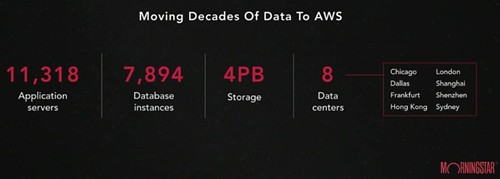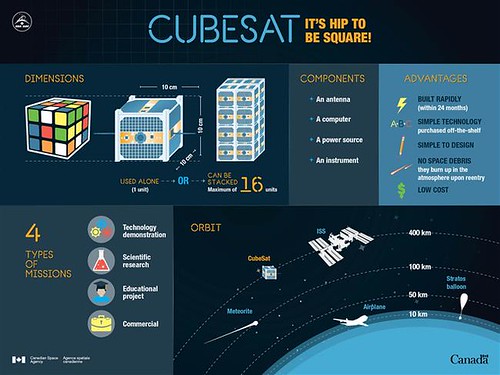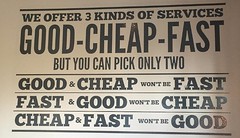Author Archives: Todd Hoff
Author Archives: Todd Hoff


Enterprises won't move to the cloud. If they do, it's tantamount to admitting your IT group sucks. That has been the common wisdom. Morningstar, an investment research provider, is moving to the cloud and they're about as enterprisey as it gets. And they don't strike me as incompetent, it just seems they don't want to worry about all the low level IT stuff anymore.
Mitch Shue, Morningstar's CTO, gave a short talk at AWS Summit Series 2017 on their move to AWS. It's not full of nitty gritty technical details. That's not the interesting part. The talk is more about their motivations, the process they used to make the move, and some of the results they've experienced. While that's more interesting, we've heard a lot of it before.
What I found most interesting was the idea of Morningstar as a canary test. If Morningstar succeeds, the damn might bust and we'll see a lot more adoption of the cloud by stodgy mainstream enterprises. It's a copy cat world. That sort of precedent gives other CTOs the cover they need to make the same decision.
The most important idea in the whole talk: the cost savings of moving to Continue reading
Hey, it's HighScalability time:

Hands down the best ever 25,000 year old selfie from Pech Merle cave in southern France. (The Ice Age)

Many moons ago, in Building Super Scalable Systems: Blade Runner Meets Autonomic Computing In The Ambient Cloud, I said we still had scaling challenges ahead, that we've not yet begun to scale, that we still don't know how to scale at a planetary level.
That was 7 years ago. Now Facebook has 2 billion monthly users. There's no reason to think they can't scale an unimpressive 3.5x to handle the rest of the planet. WhatsApp is at one billion daily users. YouTube is at 1.5 billion monthly users.
So it appears we do know how to service a whole planet full of people (and bots). At least a select few companies with vast resources know how. We are still no closer to your average developer being able to field a planet scale service. The winner take all nature of the Internet seems to fend off decentralization like it's a plague. Maybe efforts like Filecoin will change the tide.
There's another area we have scaling challenges: Massively Multiplayer Mobile AR (Augmented Reality). While AR has threatened to be the future for quite some time, it now looks like the future may be just around the virtual Continue reading

Hey, it's HighScalability time:


CubeSats are revolutionizing space exploration because they are small, modular, and inexpensive to build and launch. On an episode of embedded.fm, Professor Jordi Puig-Suari gives a fascinating interview on the invention of the CubeSat. 195: A BUNCH OF SPUTNIKS.
What struck in the interview is how the process of how the CubeSat was invented parallels how the cloud developed. They followed a very similar path driven by many of the same forces and ideas.
Just what is a CubeSat? It's a "type of miniaturized satellite for space research that is made up of multiples of 10×10×10 cm cubic units. CubeSats have a mass of no more than 1.33 kilograms per unit, and often use commercial off-the-shelf (COTS) components for their electronics and structure."
Hey, it's HighScalability time:

Think your startup has a Big Hairy Audacious Goal? Along with President Thomas Jefferson, John Jacob Astor conceived (in 1808), and implemented (in 1810) a plan to funnel the entire tradable wealth of the westernmost sector of the North American continent north of Mexico through his own hands. Early accounts described it as “the largest commercial enterprise the world has ever known.”
Think your startup raised a lot of money? Astor put up $400,000 ($7,614,486 in today's dollars) of his own money, with more committed after the first prototype succeeded.
Think competition is new? John Jacob Astor dealt with rivals in one of three ways: he tried to buy them out; if that didn’t work, he tried to partner with them; if he failed to join them, he tried to crush them.
Think your startup requires commitment? Joining Astor required pledging five years of one’s life to a start-up venture bound for the unknownn.
Think your startup works hard? Voyageur's paddled twelve to fifteen hours per day, with short breaks while afloat for a pipe of tobacco. During that single day each voyageur would make more than thirty thousand paddle strokes. On the upper Great Continue reading
Hey, it's HighScalability time:


Hey, it's HighScalability time:

Well, not exactly Fishin', but I'll be on a month long vacation starting today. I won't be posting (much) new content, so we'll all have a break. Disappointing, I know. Please use this time for quiet contemplation and other inappropriate activities. Au revoir!

Hey, it's HighScalability time:


Hey, it's HighScalability time:


With Serverless hiring less experienced developers can work out better than hiring experienced cloud developers. That's an interesting point I haven't heard before and it was made by Paul Johnston, CTO of movivo, in The ServerlessCast #6 - Event-Driven Design Thinking.
The thought process goes something like this...
An experienced cloud developer will probably think procedurally, in terms of transactional systems, frameworks, and big fat containers that do lots of work.
That's not how a Serverless developer needs to think. A Serverless developer needs to think in terms of small functions that do one thing linked together by events; and they need to grok asynchronous and distributed thinking.
So the idea is you don't need typical developer skills. Paul finds people with sysadmin skills have the right stuff. Someone with a sysadmin background is more likely than a framework developer to understand the distributed thinking that goes with building an entire system of events.
Paul also makes the point that once a system has built experienced developers will get bored because Serverless systems don't require the same amount of maintenance.
For example, they had good success hiring a person with two years of vo-tech on-the-job training because they didn't have Continue reading
Hey, it's HighScalability time:



Data is the new currency. A phrase we’ve heard frequently in the wake of the story of Unroll.me selling user data to Uber.
Two keys to that story:
In both cases prevention requires user awareness. How do we get user awareness? Force meaningful disclosure. How do we force meaningful disclosure? Here’s an odd thought: use the tax system.
If data is the new currency then why isn’t exchanging data for use of a service a barter transaction? If a doctor exchanges medical services for chickens, for example, that is a taxable event at fair market value. It's a barter arrangement. A free service that sells user data is similarly bartering the service for data, otherwise said service would not be offered.
How would it work?
Service providers send out 1099-Bs to users for the fair market value of the service. Fair market value could be determined using a similar for pay service or as a percentage of the income generated from the data being sold.
The IRS treats barter transactions as income received. Users would need to pay income Continue reading